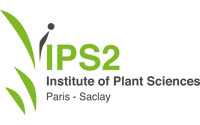Chromatin phosphoproteomics: a new tool to identify nuclear substrates of MAP Kinases
Mitogen-Activated Protein Kinases (MAPKs) are components of signaling modules which in plants, are involved in biotic and abiotic stress responses as well as in developmental processes. In particular the MAPKs MPK3, MPK4 and MPK6 are key actors of the immune signaling. These proteins can be found in different subcellular compartments, including the nucleus (Bigeard and Hirt, FPS 2018), which suggests that these MAPKs could have nuclear substrates.
In a recent study, published in PNAS (Rayapuram et al., PNAS 2021),members of the Stress Signaling group at IPS2 and collaborators from other institutes in France, Korea, Germany and Saudi Arabia contributed to develop an original chromatin phosphoproteomic approach to identify MAPK substrates playing a role in plant immunity. Among the candidates, the authors showed through deeper functional analyses that the AT-hook motif containing nuclear localized DNA-binding protein AHL13 positively controls the jasmonic acid defense pathway and that phosphorylation of AHL13 by MPK3/4/6 regulates its stability.
It is expected that other candidate substrates identified through this chromatin phosphoproteomic approach will extend in the future our understanding of MAPK functions for plant adaptation to its environment.
